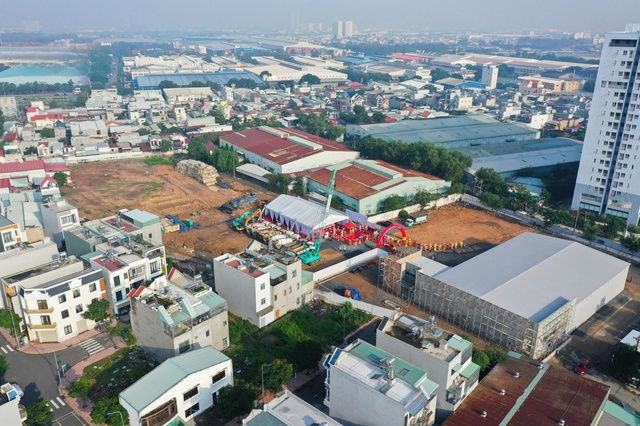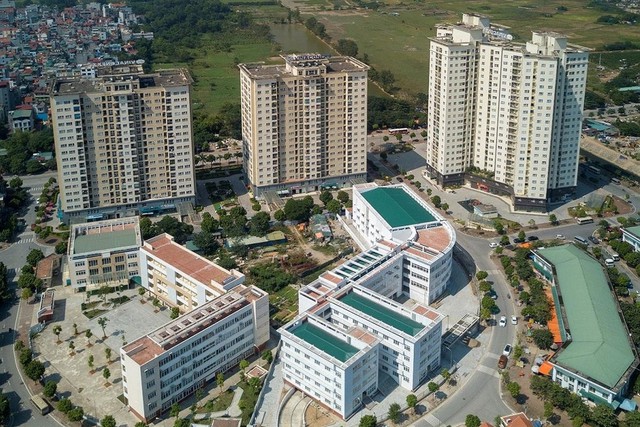From Billion-Dollar Deals…
Japanese businesses have been making their presence known in the Vietnamese real estate market, with an increasing number of investments and expanding footprints across various segments.
Notably, their joint ventures with local companies and injections of hundreds of millions to billions of dollars into residential projects showcase their aggressive interest in the country, rivaling that of long-time investors like Singapore, Hong Kong, South Korea, and China.
Most recently, two Japanese partners, Cosmos Initia (a member of Daiwa House Group) and Koterasu Group, joined forces with TT Capital to develop 2,000 TT AVIO apartments in the heart of Di An City, Binh Duong Province. The Japanese companies are investing approximately $150 million in TT Capital over the next five years, aiming to deliver 1,000 affordable, high-quality apartments to the market each year. The project has officially broken ground, marking the first collaboration between the parties in Vietnam.
Cosmos Initia, established in 1969, has a strong track record in the Japanese market and has expanded to renowned international markets such as Australia and the United States. To date, they have left their mark on nearly 2,000 projects, successfully developing over 100,000 apartment units. In this partnership, Cosmos Initia not only brings financial investment but also decades of real estate experience, participating in the entire construction and design process. They are committed to employing the most advanced solutions and ideas to deliver a superior product.
In the second quarter of 2024, the market witnessed another significant partnership between Kim Oanh Group (Vietnam) and four Japanese investors: NTT Urban Development, Sumitomo Forestry, and Kumagai Gumi Co Ltd. They joined forces to develop The One World, a 50-hectare project in Binh Duong Province. The Japanese investors injected capital by acquiring a total of 49% of the project’s shares.
In another notable deal, Japanese company Nishi Nippon Railroad acquired 25% of the shares in the Paragon Dai Phuoc project from Nam Long Group (Vietnam) for approximately $26 million. This project spans 45.5 hectares.
Previously, Hung Thinh Corporation and Marubeni Corporation (Japan) signed a cooperation agreement to develop real estate projects, with the first one located in Thu Duc City, involving an expected investment of over VND 10,000 billion.
Japanese investors have also shown a keen interest in meeting the housing needs of buyers in Hanoi and other localities, partnering with select Vietnamese companies in projects like The Manor Central Park and the high-end apartment building Hiyori Garden Tower…

Japanese businesses are joining forces with Vietnamese companies and investing hundreds of millions to billions of dollars in residential projects.
It is evident that Japanese companies are deepening their involvement in Vietnam’s real estate market. While they previously focused on buying and distributing, they are now actively seeking projects for direct investment. Their participation goes beyond financial investment, as they engage in the entire construction and design process, as well as project evaluation…
…To Plans for Affordable Housing
This raises the question: Why are Japanese investors so interested in the Vietnamese real estate market?
According to Trang Bui, CEO of Cushman & Wakefield Vietnam, foreign investors are adept at observing the next moves in the Vietnamese market, especially after the enactment of three new laws. In recent years, the Vietnamese government has encouraged and facilitated the development of affordable housing by local real estate businesses. As a result, the flow of foreign capital has also shifted to align with the market’s direction.
Therefore, it is not surprising that more and more investment funds, including Japanese giants, are targeting the affordable housing segment in Vietnam. This product segment has the best liquidity in the market. Singapore, Thailand, and China also belong to the group of countries most interested in this segment, catering to the actual housing needs of the Vietnamese market.

Affordable housing has been the best-performing segment in the market in terms of liquidity. (Illustrative image)
Additionally, the Japanese domestic market has limited growth potential due to a declining and aging population, whereas Vietnam offers immense development potential. Besides the advantages of a young population, tax incentives, and high housing demand, Vietnam’s political stability is a crucial factor in the eyes of Japanese investors.
Japanese businesses used to favor segments like industrial real estate (industrial parks, factories, and warehouses) and retail spaces. Now, they are paying more attention to urban areas and affordable housing. The reason for this shift is their assessment that there is still a considerable demand for affordable housing among young people and young families in Vietnam, with room for growth in the next decade. Moreover, this type of development carries less risk, offers faster capital recovery, and involves less complex legal procedures.
“Japan has super-low interest rates, which have been stable for decades, and this encourages Japanese investors to seek new markets like Vietnam to diversify their portfolios,” said Trang Bui.
JLL Vietnam shares this view, noting that there are hundreds of millions of dollars waiting to be invested in Vietnam’s real estate market across most segments. Affordable housing remains a priority for foreign investors, including those from Japan.
According to JLL Vietnam, in the next two decades, Vietnam will enter a golden population structure. The proportion of the working population in the service and manufacturing sectors will increase, with 25% of the population aged 10–24 and an average age of around 30. This millennial generation is expected to drive demand for low- and mid-end housing, especially in residential areas near industrial parks with convenient connections to major roads.






![[Photo Essay]: Experts, Managers, and Businesses Unite to Forge a Path Towards Sustainable Green Industry](https://xe.today/wp-content/uploads/2025/07/z678592918-150x150.jpg)


![[Photo Essay]: Experts, Managers, and Businesses Unite to Forge a Path Towards Sustainable Green Industry](https://xe.today/wp-content/uploads/2025/07/z678592918-100x70.jpg)






